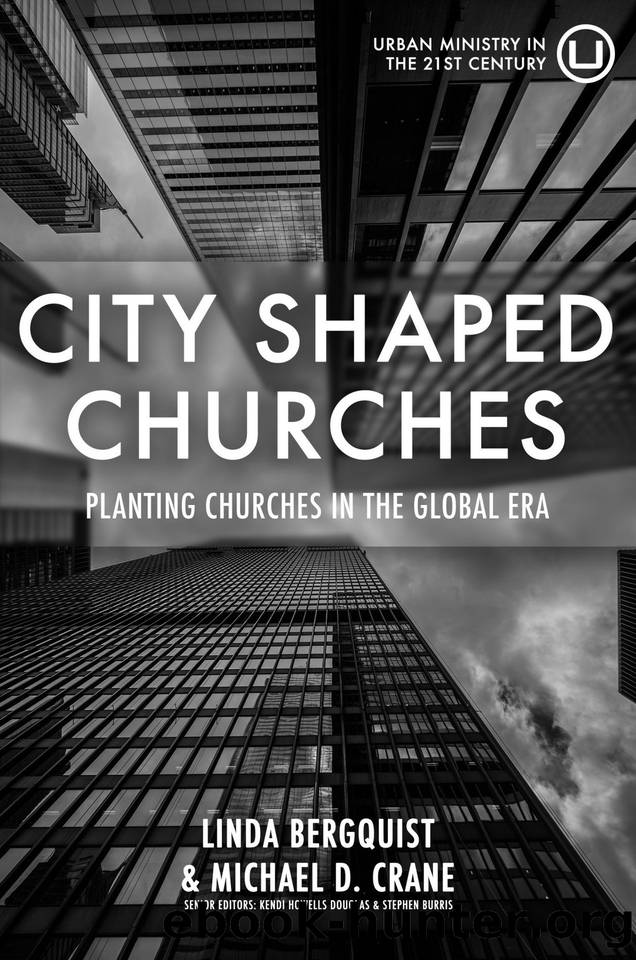City Shaped Churches: Planting Churches in a Global Era by Crane Michael & Bergquist Linda

Author:Crane, Michael & Bergquist, Linda [Crane, Michael]
Language: eng
Format: epub
Publisher: Urban Loft Publishers
Published: 2018-11-19T16:00:00+00:00
The Burgeoning Growth of the Informal Business Economy
For at least three decades now, the church-starting world in the West has embraced high-level business start-up principles. It values in particular successful franchising models, good branding and marketing principles, excellent customer service, strong management teams, scalable ways of acquiring customers, measurable results, and a work ethic that reminds us that good enough is never really good enough. These and other principles have resulted in numerous success stories, including mega-church and multi-campus models. They have also resulted in some devastating failures, but isnât failure also a hallmark of entrepreneurial culture?
In the United States, the formal economy, which includes much of the business model mentality mentioned above, had a Gross Domestic Product (GDP) of around 18 trillion US dollars in 2015. It equaled 29 percent of the world economy. In the same year, Chinaâs GDP was second highest at 11.5 trillion. Around the world, however, there is a different kind of economy rising up. It has a projected GDP of 10.7 trillion dollars, which, if it represented a nation, would be the worldâs third largest economy. We refer to it as the informal do it yourself (DIY) or shadow economy. Robert Neuwirth is an author and investigative journalist who has researched and written extensively on this topic. Neuwith (2011) defines this economy as âbusinesses that exist solely on individual effort with no help from the governmentâ (p. 22). They are neither taxed nor monitored by any government. To remove the stigma from the word, he refers to them as System D, a term coined by the French from the word débrouille, meaning to make do or manage in especially difficult situations or in an economic system that thrives on entrepreneurial self-reliance and ingenuity (Neuwirth, 2011). It is a concept valid around the world. For example, it is similar to the term jugaad in Urdu, Hindi, and Punjabi.
System D work references all kinds of informal work: gardening on the side, selling merchandise at swap meets, operating unlicensed mobile kitchens, scavenging at garbage dumps, and doing street vendor and unregistered kiosk work are just a few. Clandestine operations are also part of the informal economy, including drug trafficking, smuggling, and reproducing fake name brand goods; however, this is just a portion of the informal economy. This phenomenon has been a staple all over the world throughout human history. After the economic collapse of 2008 that threatened not just US markets but also global ones, many people had a difficult time finding and keeping work. Ingenious entrepreneurs invented all kinds of ways to make a living, and the formal economy began taking notice. Neuwirth (2011) surmises that System D will be crucial for the development of cities throughout the 21 st century.
Through most of its history, the church has also operated in the context of an informal economy. The economic system of the days when Jesus walked on earth and the days of the early church was more of an informal economy than one that was tightly regulated.
Download
This site does not store any files on its server. We only index and link to content provided by other sites. Please contact the content providers to delete copyright contents if any and email us, we'll remove relevant links or contents immediately.
The Lost Art of Listening by Michael P. Nichols(7494)
Why I Am Not A Calvinist by Dr. Peter S. Ruckman(4148)
The Rosicrucians by Christopher McIntosh(3510)
Wicca: a guide for the solitary practitioner by Scott Cunningham(3167)
Signature in the Cell: DNA and the Evidence for Intelligent Design by Stephen C. Meyer(3130)
Real Sex by Lauren F. Winner(3014)
The Holy Spirit by Billy Graham(2944)
To Light a Sacred Flame by Silver RavenWolf(2814)
The End of Faith by Sam Harris(2733)
The Gnostic Gospels by Pagels Elaine(2527)
Waking Up by Sam Harris(2454)
Nine Parts of Desire by Geraldine Brooks(2360)
Jesus by Paul Johnson(2352)
Devil, The by Almond Philip C(2324)
The God delusion by Richard Dawkins(2305)
Heavens on Earth by Michael Shermer(2278)
Kundalini by Gopi Krishna(2180)
Chosen by God by R. C. Sproul(2161)
The Nature of Consciousness by Rupert Spira(2104)
